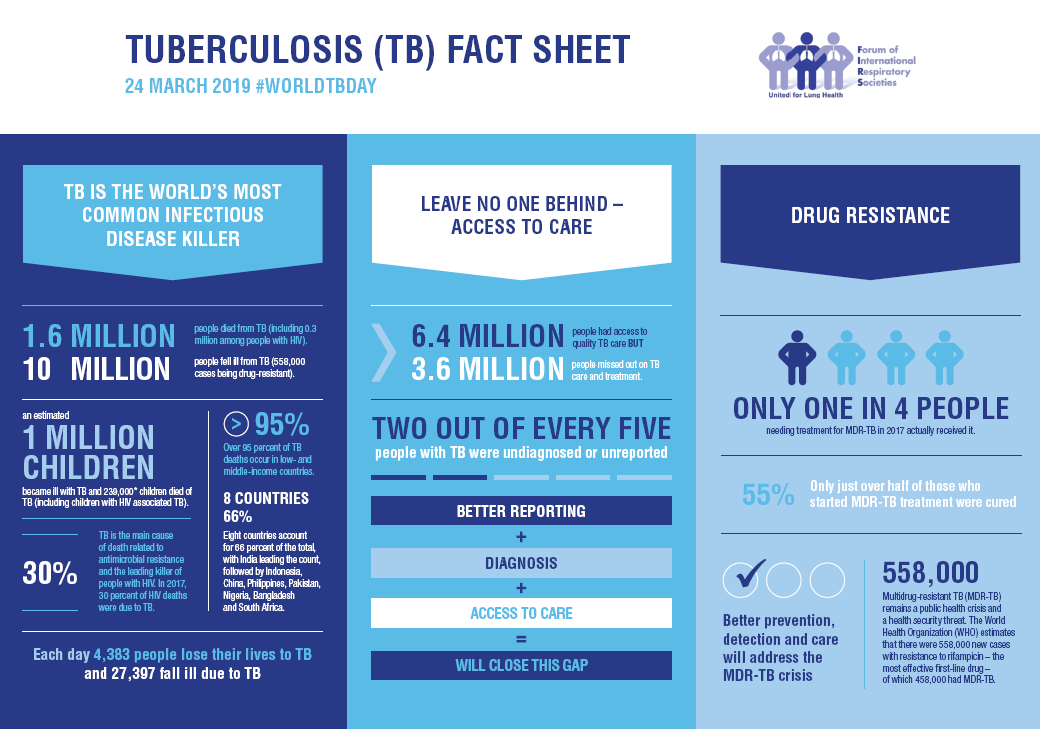World TB Day 24 March 2019

Acceleration of UN High-Level Meeting Commitments on TB Focus of International Respiratory Societies
Cape Town, Glenview, Lausanne, Montevideo, New York, Paris, Tokyo, March 24, 2019
On World TB Day, the Forum of International Respiratory Societies (FIRS) urges governments to leverage the success of the first-ever United Nation (UN) High-Level Meeting (HLM) on the fight against tuberculosis (TB), held in 2018. The meeting produced a UN political declaration on TB and endorsement at the highest level to take the necessary steps to end the TB epidemic.
TB is preventable and curable, yet it remains the world’s most common infectious disease killer. The World Health Organization (WHO) estimates that 10 million people fell ill from TB in 2017 and 1.6 million people died. Only 64 percent of the estimated 10 million global TB cases were actually diagnosed and notified. In 2017, approximately 558,000 people developed TB that was resistant to rifampicin (RR-TB), and of these, 82 percent had multidrug-resistant TB (MDR-TB). Only one in four people who needed treatment for MDR/RR-TB in 2017 actually received it.
For the first time the High-Level Meeting brought together heads of state to give the leadership that is urgently needed to address this terrible disease. This unique opportunity and momentum must not be lost.
FIRS is calling on leaders to follow through on the commitments they have made, including to:
- Successfully treat 40 million people for TB, including 3.5 million children and 1.5 million people with drug-resistant TB.
- Provide TB preventive therapy to 30 million people, including four million children under the age of five.
- Include child TB in the child survival agenda and provide family-based TB care.
Advance all areas of innovation needed to deliver new tools for TB prevention, diagnosis and treatment.
- Support a human rights-based approach to global TB.
- Mobilise U.S. $13 billion annually for TB care, and U.S. $2 billion annually for TB research and development.
FIRS urges the TB community to hold leaders accountable for their commitments, and to push governments to support the changes needed to realise the UN Sustainable Development Goal of ending the TB epidemic by 2030.
Dean E. Schraufnagel, MD, executive director, FIRS, said: “If we are to truly see an end to TB, the world’s most common and deadly infectious disease, governments must commit to scale up of research, funding, human rights and accountability. It is our job as the TB community to strive for the commitments we’ve seen from our leaders to become action and not just promises.”
By adopting the UN political declaration on TB, national leaders have said they recognise TB as a threat they are committed to eradicating. They have agreed to specific actions. The day to begin implementing this new agenda begins now.
Notes:
All quoted TB statistics are from the Global Tuberculosis Report 2018, The World Health Organization
About the Forum of International Respiratory Societies (FIRS)
The Forum of International Respiratory Societies (FIRS) is an organisation comprised of the world's leading international respiratory societies working together to improve lung health globally: American College of Chest Physicians (CHEST), American Thoracic Society (ATS), Asian Pacific Society of Respirology (APSR), Asociacion Latino Americana De Torax (ALAT), European Respiratory Society (ERS), International UnionAgainst Tuberculosis and Lung Diseases (The Union), Pan African Thoracic Society (PATS), Global Initiative for Asthma (GINA), and the Global Initiative for Chronic Obstructive Lung Disease (GOLD). The goal of FIRS is to unify and enhance efforts to improve lung health through the combined work of its more than 70,000 members globally.